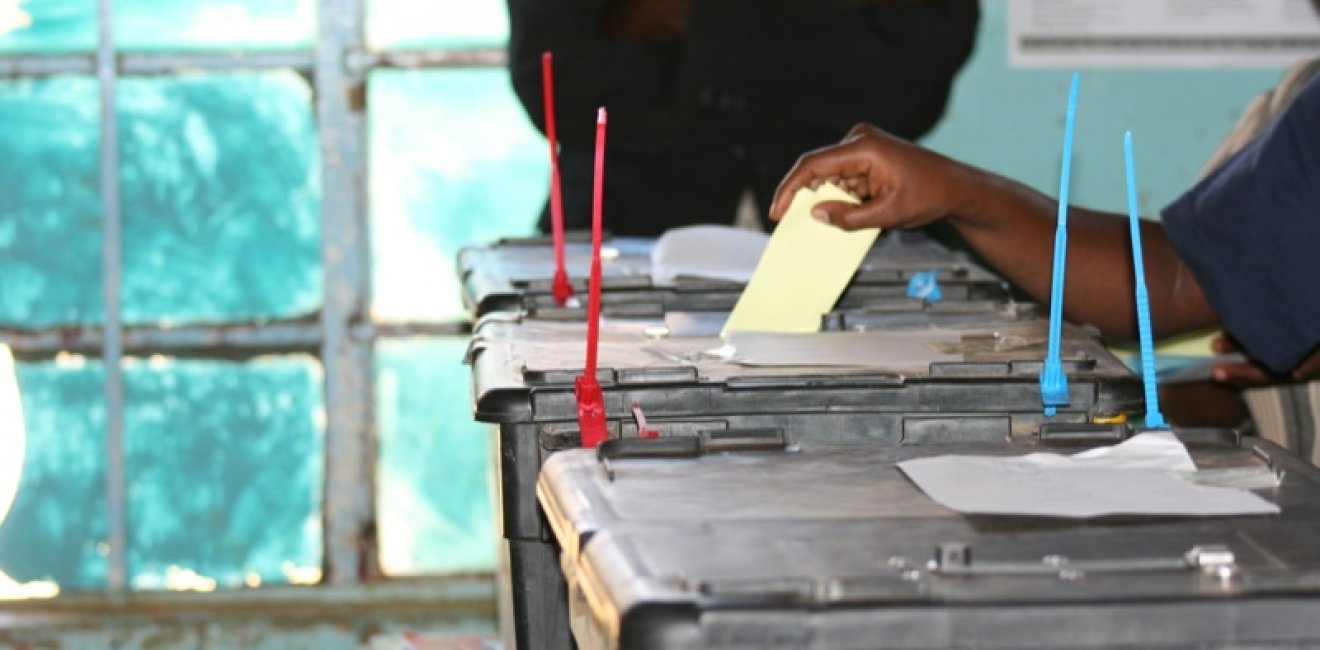
A blog of the Africa Program
[caption id="attachment_13311" align="aligncenter" width="600"] A voter casts a ballot in Kenya in 2007. The 2007 election saw a great deal of post-election violence, in part because of issues with the electoral body. Photo by Juliana Rotich, via Flickr. Creative Commons.[/caption]
A survey by Pan-African research network Afrobarometer reveals that 55% of respondents across 36 African countries have little or no trust in their national electoral bodies and how they conduct elections. Poor conduct by the electoral body is a major reason for election-related violence, as the opposition party may feel the election has been rigged, and opposition supporters may be provoked into violence.
Public confidence in the judiciary is also critical, as political parties often go to court as their last resort in seeking a fair electoral outcome. In a number of countries, courts aren't seen as trustworthy and impartial; in Nigeria a civil society group referred to the judiciary as a "major obstacle" to credible elections. When there is no confidence in the judiciary, public protests, often violent, are seen as the solution.
Election observer missions, media, civil society groups, and the citizens themselves are important players in the conduct of a peaceful and credible election.
Kenya's 2007 Elections
Kenya will hold general elections on August 8th, 2017, almost ten years since the 2007 post-election violence that led to the killing of more than 1,000 people and the displacement of 650,000 people. The violence was primarily attributed to the conduct of the now-defunct electoral body, the Electoral Commission of Kenya (ECK). In 2007, former ECK chair Samuel Kivuitu announced the official presidential results in a closed room under tight security. He later publicly admitted he did not know who actually won the election. The ECK had ignored calls from the international community to investigate the results before making a public announcement. Mwai Kibaki, the winner of the disputed election, was hurriedly sworn in at dusk by the Chief Justice, further casting doubt on the whole election process. There were other discrepancies in 2007, including delays in the transmission of election results, differences in the results announced at the constituency level and the national tally, and in one constituency, voter turnout that reached 115%.
The Krieglar Commission was tasked with investigating the conduct of the elections and providing recommendations to improve the process in the future. The Commission recommended that voters be issued ballot papers for all the various elective seats at once, to avoid scenarios where turnout is much higher for the presidency than for parliamentary seats. The Commission also recommended the adoption of an integrated, secure tallying and data transmission system.
Kenya's 2013 Elections
The newly created electoral body, the Independent Electoral and Boundaries Commission (IEBC), adopted the use of several new technologies in the 2013 general election, in order to improve the credibility of the election and avoid the circumstances that led to the 2007 post-election violence. Several new technologies were implemented: Biometric Voter Registration (BVR) was used to register eligible voters, Electronic Voter Identification (EVID) was used to verify and confirm registered voters by the BVR kit, and a Results Transmission System (RTS) was used to relay results from the constituency level to national tallying center. However on election day, there were significant failures due to poor testing, loss of electricity, and a computer bug that multiplied the number of rejected votes by eight, which confused the total count of votes cast.
The opposition challenged the election outcome at the Supreme Court on the basis of these technological failures, but it lost the case. Despite these failures and the contestation of the outcome, the 2013 election was much more peaceful than the large-scale violence of 2007.
Kenya's 2017 Elections
Ahead of the August 2017 election, about 4,000 candidates are running as independent candidates for various elective seats. The IEBC has cleared 8 candidates to run for the Presidency.
There is a new IEBC Commission after the previous team was sent home in October 2016. They resigned following continuous protests by the opposition on the grounds they could not be trusted. There is still a pending case in court on the "chicken gate scandal," in which former top IEBC officials allegedly received bribes from two top executives in the UK in order to procure the purchase of ballot papers.
Is the IEBC ready to handle the upcoming elections?
The new commission, which took office on January 20, 2017, faces key challenges including numerous cases lodged in the courts that have slowed down its performance and overturned previous IEBC regulations. After the failure of the BVR kits used in the 2013 elections, the government has had to purchase new ones. The IEBC has also commissioned an external audit of the voter registry after complaints about large-scale multiple registration of the same voters. There is currently a mass campaign for voters to verify their registration details.
In January 2017, President Uhuru Kenyatta signed into law a contentious bill that allows a manual back-up voting system in case the electronic one fails as in the 2013 general elections. The joint legal affairs and ICT committee that probed the issue noted the need for a backup to the electronic system, but the opposition has said the move is an attempt to create an opportunity to rig the elections.
Another ongoing conversation was prompted by the High Court ruling that presidential results announced at the constituency level will be final and cannot be changed at the national tallying center. The IEBC has appealed the decision, on the grounds that the results need to be announced by the IEBC chair at the national returning center, and that a mistake by the returning officer can be corrected at the national tally center. Whatever the outcome, both the media and political coalitions should stick to the agreement of holding a parallel tallying center to ensure an accurate count, but that the IEBC officially announces the results. This will help keep order, and avoid a situation where the media announce results from the constituency level at different intervals, creating confusion.
Looking Forward
The campaign period has officially begun and all eyes are on the media. The media should provide in-depth analysis and fair coverage of the campaigns. It has a vital role to play in exposing politicians who are illegally using public resources for their campaigns. Journalists should stick to the election codes and allowed the IEBC to officially announce results, though they should investigate when announced electoral results do not seem right. Journalists and the public have an important role to play in reporting instances of electoral malpractice.
Parliament dismissed the judiciary's request to amend the constitution to increase the length of time to hear a presidential election petition. This is unfortunate, allowed both parties to present all their evidence and given the court more time to deliberate in the event of a petition. Despite that rebuff, the judiciary has noted that it is ready to handle election petitions. Last year, the image of the Supreme Court was tainted after a judge was accused of receiving a bribe from a politician to influence the outcome of a case. This election, and the court's handling of any election disputes, will be another test for the judiciary.
The IEBC must conducts its activities in a free and transparent manner. In the past, there have been instances where members of the opposition, election observers, and even certified party agents have complained of being locked out of the vote counting process. Elections are a democratic process, transparency and fairness at the electoral body is a crucial first step toward ensuring they remain that way. The media and the judiciary also have important electoral roles to play in ensuring the upcoming elections are credibly and fairly conducted. And finally citizens need to embrace the outcome of a credible election.
Sharon Anyango Odhiambo was a Southern Voices Network for Peacebuilding Scholar at the Wilson Center from February to April 2017. She is a Communication and Outreach Officer at the African Technology Policy Studies Network (ATPS), a member organization of the Southern Voices Network for Peacebuilding.
Author

Communications and Outreach Officer, African Technology Policy Studies Network, Kenya

Africa Program
The Africa Program works to address the most critical issues facing Africa and US-Africa relations, build mutually beneficial US-Africa relations, and enhance knowledge and understanding about Africa in the United States. The Program achieves its mission through in-depth research and analyses, public discussion, working groups, and briefings that bring together policymakers, practitioners, and subject matter experts to analyze and offer practical options for tackling key challenges in Africa and in US-Africa relations. Read more

Explore More in Africa Up Close
Browse Africa Up Close
The Innovative Landscape of African Sovereign Wealth Funds



